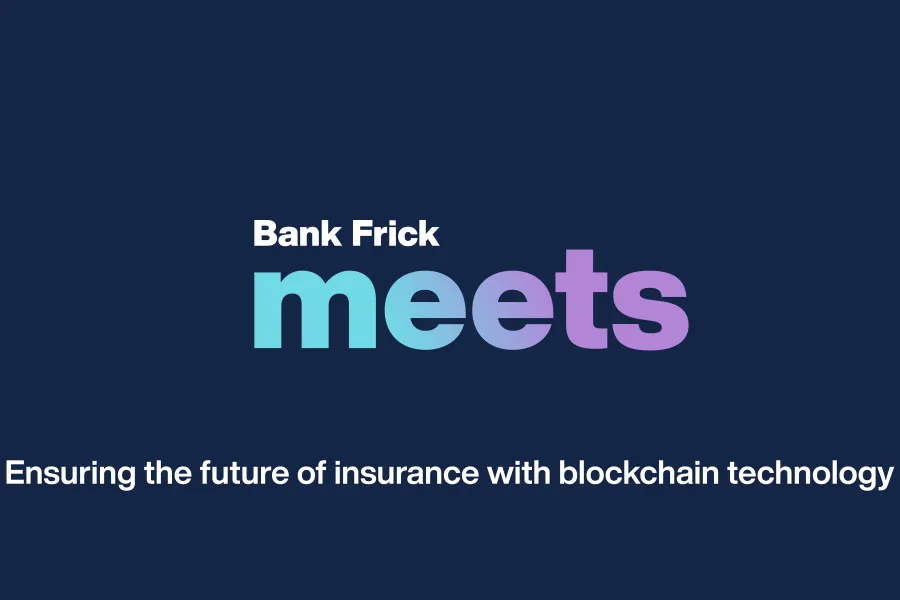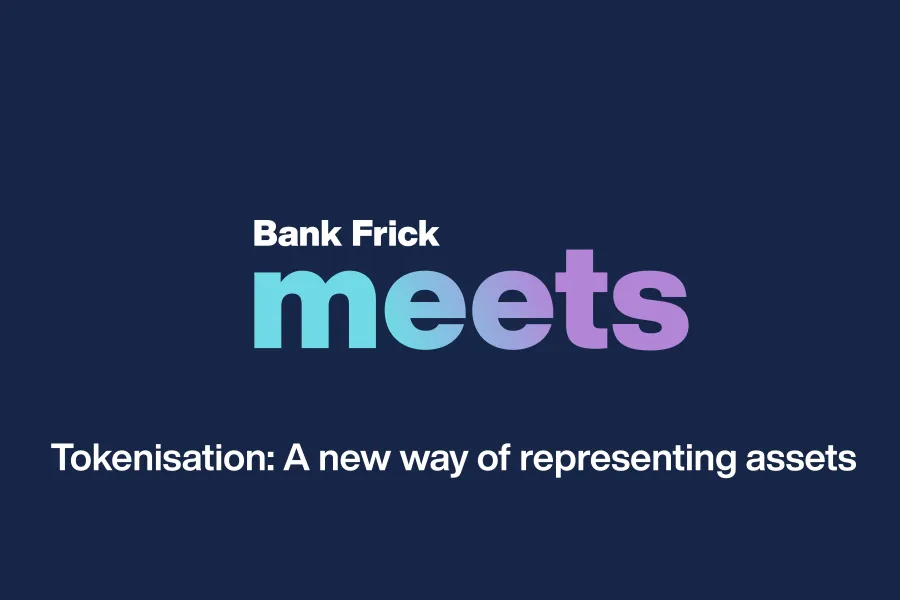«Finanzprofis in Liechtenstein werden wir immer treu bleiben»
Bank Frick bleibt trotz ihres Erfolges mit Blockchain Banking eine familiengeführte lizenzierte Vollbank für Intermediäre. Im Interview erläutert Stefan Rauti, Head of Private Clients and External Asset Managers, den Mehrwert für Finanzprofis und die Zukunft von Bank Frick.
Mit Blockchain Banking ist Bank Frick weit über die Landesgrenzen hinaus bekannt geworden. Hat sich die Bank vollends darauf konzentriert?
Über unser Neugeschäft und die grosse Aufmerksamkeit freuen wir uns natürlich, aber die Gefahr liegt in der externen Wahrnehmung. Unsere Bestandskunden wissen, wofür wir stehen: Wir unterstützen Vermögensverwalter und Treuhänder dabei, gemeinsam für ihre Kunden die besten Lösungen zu entwickeln. Aber es gibt viele, die das noch nicht wissen. Finanzprofis aus Liechtenstein sage ich deshalb: Wir sind die ideale Bank für euch!
«Finanzprofis aus Liechtenstein sollen uns als erste Adresse wahrnehmen»
Also einmal Blockchain und zurück?
Weder hin und zurück, noch denken wir in getrennten Bereichen. Wir bieten integrierte Classic und Blockchain Banking Services unter einem Dach. Neben dem klassischen Kerngeschäft können wir damit einen Schritt weitergehen als andere und unseren Kunden zukunftsgerichtete Dienstleistungen anbieten – alles im regulierten Rahmen der Bank. Darauf können sich unsere Kunden verlassen. Als Intermediärbank ist Bank Frick insbesondere dank Vermögensverwaltern und Treuhändern gross geworden. Diesen Finanzprofis werden wir immer treu bleiben – das beweisen auch unsere über Jahrzehnte gewachsenen Beziehungen.
«Wir ermöglichen unseren Kunden das Geschäft»
Konten, Zahlungsverkehr, Handel: Ist Bank Frick im Classic Banking nicht komplett austauschbar?
Richtig, Konten bieten alle. Bank Frick bietet aber viel mehr als nur relevante, aber austauschbare Bankdienstleistungen. Unser grösstes Asset ist unsere fachübergreifende Beratungskompetenz – persönlich und digital. Wir arbeiten auf Augenhöhe mit unseren Kunden, analysieren ihren Business Case und entwickeln anschliessend gemeinsam massgeschneiderte Lösungen. Als unternehmerische Bank gehört dieses Angebot sozusagen zu unserer DNA. Einem Vermögensverwalter bieten wir also nicht bloss ein Konto, sondern wir ermöglichen unseren Kunden das Geschäft und erleichtern dann ihren Alltag.
Wo sieht sich Bank Frick in Zukunft?
Wir werden die familiengeführte Bank mit der persönlichen Note für Finanzprofis bleiben. Damit ist auch gesagt, dass sich Vermögensverwalter und Treuhänder mit ihren Bedürfnissen immer an uns wenden können. Unsere klassischen Bankdienstleistungen ergänzen wir mit zukunftsgerichteten und digitalen Services, wodurch wir für unsere Kunden einen Schritt weiter gehen. Dieses integrierte Produktportfolio und die starke Beratungskompetenz von Bank Frick sind dabei die Grundpfeiler unserer Zukunft. Und damit auch für nachhaltige Geschäftsbeziehungen, die wir eingehen möchten. Stabilität und Verlässlichkeit zeichnen uns somit auch morgen aus.
Share post

Related Posts

How Blockchain Enables Transparency and Efficiency
Blockchain technology, first demonstrated in 2010 through a historic Bitcoin transaction, has evolved far beyond cryptocurrencies, offering solutions for transparency, efficiency, and decentralization across industries. Its core principles—decentralization, transparency, and immutability—enable secure, peer-to-peer transactions without intermediaries. Innovations like Ethereum's smart contracts have expanded blockchain's capabilities, impacting supply chains, automation, and governance.
Despite concerns about energy use, modern blockchains are increasingly energy-efficient, and misconceptions about complexity or security often stem from misunderstandings. For nonprofits, blockchain offers transformative potential: donations can be transferred quickly, cost-effectively, and transparently, ensuring more funds reach beneficiaries while improving accountability and impact measurement.
As blockchain reshapes societal structures and trust, it presents nonprofits with powerful tools to amplify their impact. Organizations willing to embrace this innovation will be well-positioned to drive meaningful change in an interconnected digital world.

Insights into the process of designing AMCs
Since their introduction, Actively Managed Certificates (AMCs) have become a significant component of the European financial market. As a structured product, legally classified as debt securities, they hold a counterparty risk for the investor that is comparable with other structured financial products. AMCs are securitised, which gives the holder the right to cash repayment or the delivery of an underlying asset. As the buyer, the investor becomes a creditor of the issuer and thus dependent in terms of the type and amount of repayment, which is subject to different parameters.

Direct market access – efficient trade execution for fund strategies
Liechtenstein has a long-standing tradition in the fields of banking and asset management. Since joining the EEA in 1995, Liechtenstein’s financial centre has established itself as a professional point of reference for promoters of collective investment vehicles on the European financial market.

Ensuring the future of insurance with blockchain technology
The insurance market is an essential part of the global economy, covering both personal and business risks. Thus, it is no wonder that it is one of the largest industries in the world, boasting an estimated value of about USD 5 trillion and employing about 2.7 million people across the globe. Out of USD 5 trillion, around USD 3.7 trillion makes up the value of the global life insurance market, while the value of the property and casualty insurance market carries a value of USD 1.3 trillion.

Tokenisation: A new way of representing assets
Ever since the dawn of time, human beings have hunted and gathered, collecting the things they discovered and making them their own. This was when the concept of ownable assets first emerged, albeit in rudimentary form. Since then, assets have evolved and become more complex as humans have found more reliable ways to connect assets to people. Today, people enter into legal contracts when transferring assets.

Blockchain: A technology with social impact
Foundational technology is the most effective tool for impacting society at large and solving the challenges it is faced with. One such foundational institutional technology is the blockchain, which entered the picture through the discovery of Bitcoin in 2009 and has since proliferated and emerged in many different forms.
What does blockchain’s social impact look like?

How blockchain technology protects us from bad actors in our digital future
The blockchain industry has experienced significant growth in the last couple of years as one unicorn after another sprouts from the soil that grows crypto start-ups. In this new series of blog posts and webinars, we take a closer look at the technology and explore why it is so successful and why everybody is talking about it. We also look beyond the speculative aspect that blockchain is so frequently associated with and focus on the real-world problems that the technology is poised to solve.

Wie klassische Finanzintermediäre in der Krypto- und Blockchain-Welt Fuss fassen können
Mit zunehmender Selbstverständlichkeit fragen immer mehr Kunden nach Dienstleistungen rund um Kryptowährungen. Für Finanzintermediäre eröffnet diese Nachfrage neue Geschäftsmöglichkeiten. Um das Potenzial heben zu können, müssen die Akteure aber auch das Spezialwissen zur Verfügung haben.

Blockchain technology reinvents correspondent banking – just not yet
As one of its major use cases, blockchain technology is said to transform traditional correspondent banking. So far major challenges have pushed back this transformation. It is more likely than ever that with central bank digital currencies on the horizon; blockchain disruption will finally come to fruition in the realm of cross-border banking.

Turning crypto investment into an earning asset
With Ethereum upgrading to Proof of Stake, the crypto world is going through one of its most transformative shifts to date. This means that customers will soon be able to earn interest on their digital asset holdings through a process called staking. What staking is, how it will define the future of Ethereum and digital asset custody at large is explained in this article.